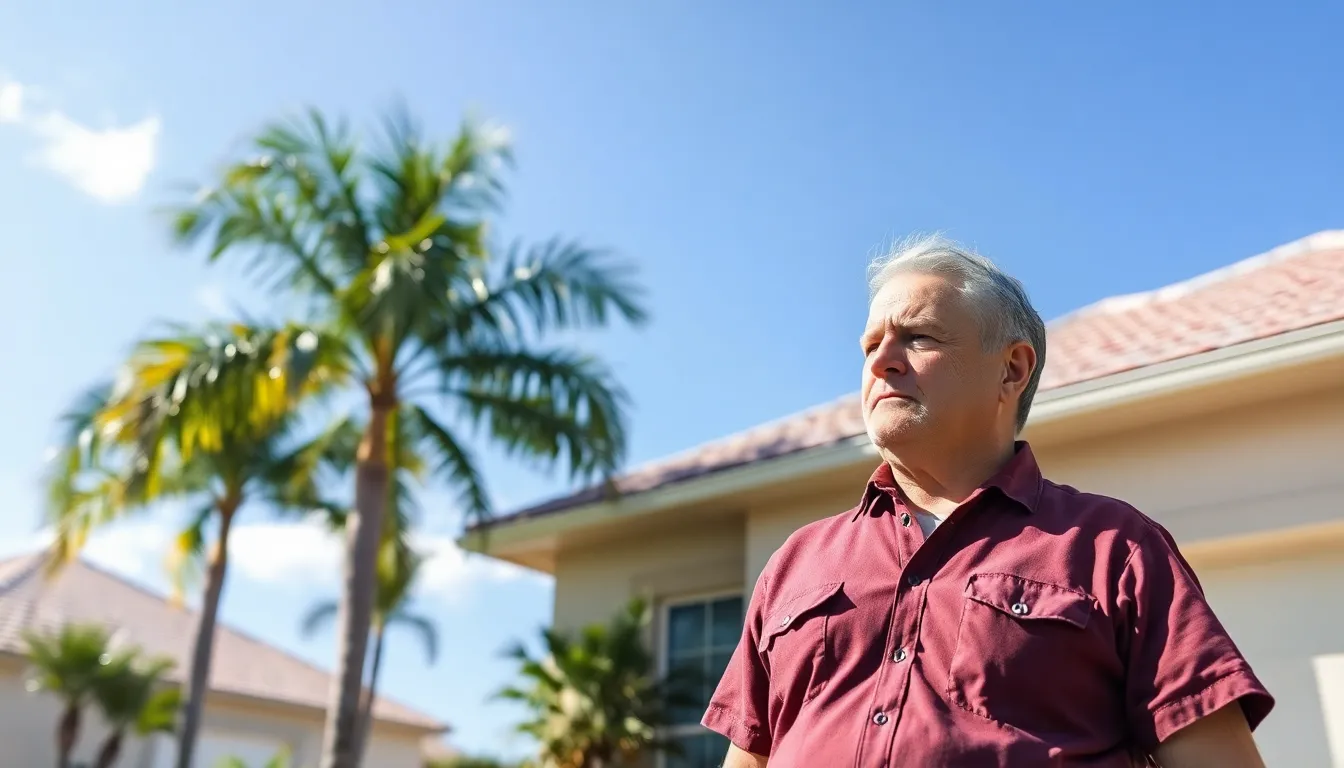Living in Florida is like being on a never-ending vacation—sunny beaches, palm trees, and an occasional hurricane party. But while the sun shines bright, it’s crucial to shield your home from the unexpected. Home insurance in Florida isn’t just a good idea; it’s your safety net against wild weather and the occasional alligator that thinks your backyard is the next hot spot.
Navigating the world of home insurance can feel like trying to find a parking spot at the beach on a Saturday. With so many options out there, it’s easy to feel overwhelmed. But fear not! Understanding your coverage can be as easy as a beach day. From hurricanes to theft, Florida home insurance has you covered, allowing you to enjoy the sunshine without worrying about what’s lurking around the corner.
Table of Contents
ToggleOverview of Home Insurance Florida
Home insurance in Florida provides crucial protection for homeowners against various hazards. It typically covers damages from fire, theft, vandalism, and certain natural disasters. Given Florida’s susceptibility to hurricanes, coverage for wind and water damage becomes essential for many.
Premium costs vary significantly based on factors like location, home value, and policy type. Homeowners often find that policies may include additional protections for personal belongings and liability coverage against injuries on their property. Research indicates that Florida homeowners pay an average premium of around $3,600 annually, which reflects the state’s high risk from severe weather events.
Understanding the types of coverage available helps consumers make informed decisions about their policies. Basic homeowners insurance generally falls into two categories: HO-1 and HO-3. The HO-3 policy is the most common, offering broad coverage for the structure and contents of the home against various risks.
In addition, many Florida residents opt for optional endorsements to enhance their coverage. These endorsements may include flood insurance, which is crucial given the state’s vulnerability to flooding during storms. Specialized policies also exist for homes in flood-prone areas, addressing specific risks associated with those locations.
Consulting with an experienced insurance agent can help clarify options and streamline the process. They can assist in evaluating specific needs and tailoring coverage to match unique circumstances. Shoppers should compare multiple quotes to ensure they obtain the best rates and coverage to fit their needs. In Florida, securing robust home insurance contributes significantly to peace of mind in a region known for its beautiful but occasionally tumultuous weather.
Types of Home Insurance Policies

Various home insurance policies cater to Florida residents, ensuring adequate protection tailored to specific needs. Homeowners should consider their options carefully to find the best coverage.
Standard Homeowners Insurance
Standard homeowners insurance typically includes essential protections for dwellings, personal property, and liability. HO-1 and HO-3 represent the most common policy types. HO-3, an open-peril policy, covers risks unless explicitly excluded, making it popular among homeowners. Fire, theft, and vandalism fall under its coverage umbrella. Additionally, personal liability coverage shields homeowners against claims from accidents occurring on their property. Many Florida homeowners choose this policy due to its comprehensive nature and ability to protect against natural disasters, particularly hurricanes.
Specialty Home Insurance
Specialty home insurance targets unique circumstances that standard policies may not fully cover. For example, high-value homes often require additional endorsements or separate policies to safeguard valuable items such as jewelry or fine art. Another option includes vacation home insurance, specifically designed for properties not occupied year-round. Landlord insurance serves those who rent out properties, providing coverage for building damage and liability. Flood insurance remains essential for many in Florida, given its susceptibility to flooding. These specialty policies assist homeowners in addressing specific risks associated with their properties.
Factors Influencing Home Insurance Rates
Home insurance rates in Florida depend on various factors. Understanding these factors helps homeowners anticipate costs and find the best coverage.
Location and Risk Factors
Location significantly impacts home insurance rates. Properties situated in coastal areas face higher risks from hurricanes and flooding. Urban neighborhoods experience increased theft rates, affecting premiums. Insurance companies evaluate community safety ratings, which vary across regions. The proximity to fire stations and emergency services also plays a role; homes closer to these resources often enjoy lower rates. Notably, Florida’s unique weather patterns contribute to heightened risk assessments, making geographic considerations essential.
Home Features and Safety
Home features influence insurance costs as well. Age and condition affect rates; older homes may require updated systems that mitigate damage risk. Properties equipped with safety devices like alarms and deadbolts generally receive lower premiums. Roof materials matter as well, with stronger materials resisting storm damage seen favorably by insurers. Additional features such as pools and trampolines can increase liability risks, possibly raising rates. Homeowners can offer details about their property’s features when seeking quotes, leading to more accurate pricing based on specific risks.
How to Choose the Right Home Insurance
Choosing the right home insurance involves understanding specific coverage needs and comparing different providers. These steps ensure comprehensive protection tailored to Florida’s unique risks.
Assessing Coverage Needs
Assess specific risks when determining coverage requirements. Homeowners in Florida face challenges like hurricanes and flooding, making this assessment critical. Consider factors including property value and location when selecting appropriate coverage. Individual circumstances, such as whether the home includes valuable collections or historical features, also influence choices. Those living in high-risk areas may need broader protection. An effective way to gauge necessary coverage is to consult with insurance agents who specialize in Florida policies, as they provide insights into popular endorsements like flood insurance. Ultimately, evaluating needs ensures adequate protection against potential hazards.
Comparing Insurance Providers
Research various insurance providers to find the best rates and services. Each company may offer different policy features, which affects coverage and price points. Online tools simplify the comparison process, allowing homeowners to review multiple quotes efficiently. Pay attention to customer reviews, as they reflect service quality and claims satisfaction. Additionally, consider financial stability ratings from independent agencies; these ratings indicate an insurer’s reliability. Engaging directly with agents can also yield tailored information about coverage options. Through thorough comparisons, homeowners can feel confident securing a policy that meets their unique needs while providing peace of mind in Florida’s unpredictable climate.
Common Exclusions in Home Insurance Florida
Many homeowners in Florida overlook common exclusions in their home insurance policies. Flood damage often isn’t covered under standard homeowners insurance, which can pose significant financial risks given the state’s vulnerability to storms and rising sea levels. Additional water damage from sewer backups may also be excluded.
Earthquake damage presents another area of concern. Florida experiences minimal seismic activity compared to other states, resulting in many insurers omitting earthquake coverage from standard policies. In certain cases, homeowners must purchase specific insurance policies or endorsements to safeguard against this risk.
Wear and tear, neglect, or poor maintenance won’t typically receive coverage under home insurance. Many residents assume that general upkeep is part of their insurance policy, which can lead to unpleasant surprises during claims.
Mold damage falls under this category as well. Even though mold can result from water damage, policies often limit coverage for mold growth if it wasn’t addressed immediately by the homeowners.
Additionally, personal property stored in a unit like a storage facility might face exclusions. Homeowners should check their policies for limitations regarding items stored off-site, particularly for high-value items.
Some homeowners assume liability coverage extends to incidents occurring off the property. Liability typically covers incidents on the insured premises; off-site incidents can fall outside the scope of protection.
Lastly, intentional damage or criminal activity will never be covered. Insurance providers exclude claims arising from illegal activities or action taken with malicious intent. Homeowners must recognize these exclusions to make informed decisions about their insurance needs, ensuring adequate protection for their properties.
Navigating home insurance in Florida can feel overwhelming but it’s essential for protecting one’s investment. With unique risks like hurricanes and flooding, understanding coverage options is crucial for homeowners. By carefully assessing personal needs and comparing various policies, individuals can find a plan that offers both adequate protection and peace of mind. Consulting with knowledgeable insurance agents can provide valuable insights into the intricacies of Florida’s insurance landscape. Ultimately, securing the right home insurance allows residents to enjoy the beauty and vibrancy of Florida without the constant worry of unexpected events.






